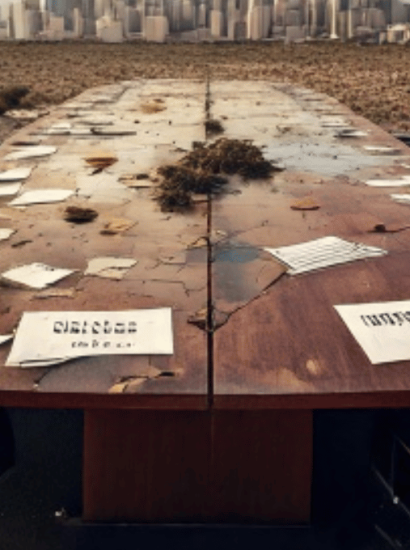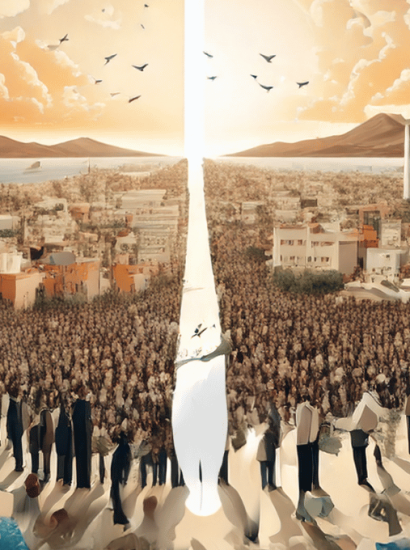This post is also available in: ΕΛΛΗΝΙΚΑ (GREEK) TÜRKÇE (TURKISH)
It wasn’t exactly silence. “A stillness like mist” covered everyone, big and small, five in number, sitting at that hour, in the evening, somewhat late, around the table; yes, this phrase of Dido Sotiriou in the “Commandment” is, I think, the most accurate description of what followed, after the plate fell to the floor and the tiny fragments were scattered in every corner of the room.
The fragments made an impression on the slender boy, barely six years old. They seemed disproportionately many for the small size of the plate. But he did not know at the time. He could not even vaguely grasp its true size. Let alone all that it held. That definitely would have seemed disproportionate to him. Can a plate hold a place? As if that’s possible!
The stillness did not last long, a few seconds all in all, though it seemed like a long, endless time. Until a heartbreaking “No, Hambi” came from the woman’s mouth, which irrevocably and definitively consolidated the separation of the “before” from the “after”, of their already divided into “before” and “after” lives.
Parenthesis:
How do children who have never experienced war grow up, I wonder? With what stories? Their parents and grandparents tell them stories, don’t they? Surely they tell them too. But what stories? And when did they take place? In his house all narrations had to be – this he learned was the right thing to do – set chronologically. Everything happened “before the war” or “after the war”. Sometimes his family would get confused and they would ask each other, “…when was it, Hambi, before the war or after the war that…” They may have agreed, they may have not agreed, they may have not concluded, they may have gotten carried away in conversation, since the names, the streets, the descriptions, the experiences, the memories led to other names, other streets, other descriptions, other experiences and other memories that gave birth to new stories and new narratives… But everything, all of everything, had happened “before the war” or “after the war”. Never and nowhere else did anything happen! The only certainty of their lives.
The parenthesis closes.
So, after that heartbreaking “No, Hambi” came from the woman’s mouth, which irrevocably and definitively consolidated the separation of “before” from “after”, there followed an inconsolable grief, an ineffable grief, that one would feel as – an orphan? a stranger? – who no longer has a person to call their own in life.
The plate was relatively small, clear glass with vertical streaks. He had heard them say it was a “Heirloom from Varosi”. He didn’t know what a “heirloom” meant, only that whatever it was, it was precious and he had to take great care of it. He couldn’t quite define what Varosi was either. But would you think it a paradox – that he had known about that… since forever? How could he possibly have always known? And yet. As if it was an integral part of him, that’s how he felt, something he had carried with him since he was born, perhaps even before then, before he was born, he couldn’t say it with certainty, but surely… ‘from birth’.
A “Heirloom from Varosi” then. The only one. Nothing else. As soon as the war broke out, the man still a soldier, the woman alone in the house, took three children under her arms, the plate of food from the table and closed the door behind her. Without a second change of clothes, without photographs so the memories may have lace outlines, without anything. She believed she would open it again, in a few days. How long would it last, after all? A few days? A week? Two at the most? Then they would return. That’s what she thought. She, and everyone else. That’s why in the new house, for years the plate was their “home”. “The plate and your eyes” [Editor’s note: ‘and your eyes’, Greek idiom meaning someone/something is precious and one ought to take great care of it]. Until that night, when it fell and broke. And since then, there is nothing tangible left from their “home”. Except the things they carried within them, feelings and memories.
The boy, however, who with a child’s innocence had put those moments to sleep for many years, a decade or more, until they were awakened one afternoon by the same phrase, “No, Hambi”, which came from the woman’s mouth, even more heartbreaking this time, muffled and otherworldly, as she heard the man tell her that her mother had been killed in that unjust way — he had always believed that nothing was ever permanently erased, that the tiny fragments of the small plate had penetrated the corners, the cracks and crevices of the walls, had become one with their texture and continued to be nourished like a bulb deeply rooted in the earth.
Source: THE PLATE






